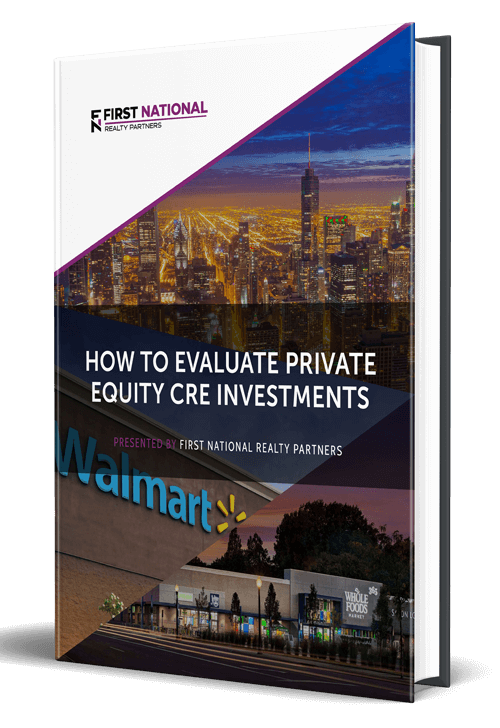For individuals interested in commercial real estate (CRE) assets, there is no shortage of investment options. In fact, there are so many that the choices can be overwhelming. In this article, we will review them in two buckets, direct and indirect. But first, let’s start by defining exactly what a commercial real estate asset is.
Commercial Real Estate – Defined
Commercial real estate is a class of assets that are acquired with the intent to earn a profit through cash flow, price appreciation, or both. The space in commercial properties is leased to other businesses (with the exception of multifamily properties) and there are 4 widely recognized types of commercial real estate:
- Office: Office space and office buildings can range from general uses – like an accounting firm – or specific uses like medical office.
- Retail: Retail space is leased to companies who operate consumer facing businesses and these are often grouped together in shopping centers or malls.
- Industrial: The space in an industrial property is leased to companies who have an “industrial” use case. This includes manufacturing and distribution facilities.
- Multifamily: Multifamily properties and apartment complexes are the one property type whose tenants are individuals, not businesses. But, commercial multifamily properties are those with 5 or more units.
The potential benefits of commercial real estate investment include stable cash cash flow, price appreciation and tax reduction. For those seeking these benefits, there are a number of ways to invest.
Bucket #1 – Direct Purchase / Active Investment
The first major bucket for investors looking to invest in real estate is to consider the direct purchase of a commercial property. With this investment strategy, one or more investors finds and purchases one of the above property types directly. There are benefits and risks to this approach.
The primary benefit of a direct investment is control. The real estate investor(s) have direct control over the property identification, selection, financing, due diligence, leasing, and management decisions and the freedom to execute their own business plan for the property.
However, commercial properties are expensive, which may limit the opportunities available to individual investors. In addition, it could require them to use most or all of their capital for just one transaction, which can limit their portfolio diversification. Finally, commercial properties are incredibly time consuming to manage and require a high degree of operational expertise to do so. For these reasons, a direct purchase of a commercial property is likely not the best option for most investors. They may prefer an indirect purchase.
Bucket #2 – Indirect Purchase
The second major bucket for commercial real estate investing is an indirect purchase. This bucket does not involve purchasing a physical property directly, rather it involves purchasing shares of a company that owns a property. In nearly all cases, this is facilitated by working with an investment manager or investment firm. Broadly, indirect purchase options can be further broken down into two groups, REITs and Private Equity Firms.
Real Estate Investment Trusts (REIT)
A Real Estate Investment Trust (REIT) is a company that owns, operates, or finances income-producing real estate. When an investor purchases shares in a REIT, they get access to the income and profits produced by the underlying properties. As an investment opportunity, a REIT offers a number of benefits, including: passive income, portfolio diversification, transparent corporate governance, tax savings, and strong performance relative to the investment alternatives.
But, there are also downsides to a REIT investment. They can be growth constrained because they’re required to pay at least 90% of their taxable income as dividends. And, those same dividends are taxed as ordinary income for the investors who receive them. In addition, their price can be volatile and they can have a high front-end “load”, meaning that REIT managers can take 5% – 10% of the initial investment in the form of fees.
From class A apartment buildings to industrial assets, REIT capital can be deployed into all commercial building types. Broadly, there are four types of REITs:
- Equity REITs: Equity REITs are publicly traded companies that own or operate income-producing real estate for the purpose of distributing dividend income to their shareholders. The majority of REITs fall into this category.
- Mortgage REITs (mREITs): Mortgage REITs (mREITs) provide financing for income-producing real estate by originating mortgages or purchasing mortgage-backed securities. They earn income from interest on the loans and/or dividends from security investments.
- Public Non-Listed REITs: Public, non-listed REITs (PNLRs) are registered with the SEC but do not trade on national stock exchanges. However, they follow the same philosophy of investing in income-producing properties for the purpose of distributing dividends to their shareholders.
- Private REITs: Private REITs are exempt from SEC registration requirements and their shares do not trade on national stock exchanges. To invest in a private REIT, an investor must meet income and/or net worth hurdles or demonstrate that they are sophisticated enough to understand the risks of investing in non-publicly traded securities.
If none of the above REIT options meet an investor’s needs, the other major indirect bucket is investing through a private equity firm.
Private Equity Commercial Real Estate Firms
Private Equity Real Estate firms and REITs have a similar mandate, to pool investor money and deploy it in real estate assets. However, the securities offered by Private Equity Real Estate firms are not publicly traded and they are only available to “accredited” or high net worth investors.
Because they aren’t bound by the same regulations as publicly-traded REITs, private equity firms have wide latitude to invest in a variety of real estate asset classes, which may or may not include rental properties. In addition, the legal structure may differ significantly from a REIT and they are not required to pay out a high percentage of their income in dividends. Instead, the majority of private equity returns are derived from profitable investment exits in the form of capital gains and carried interest.
Like REITs, a private equity real estate investment comes with a series of impressive benefits:
- Acquisition and Operational Expertise: The identification, selection, acquisition, and operation of a commercial real estate asset requires deep expertise and significant experience. This is a private equity real estate firm’s area of expertise.
- Tax Efficiency: Private Equity Real Estate investments are structured in a tax-efficient manner allowing investors to reduce taxable income through depreciation.
- Flexibility: Because they aren’t as heavily regulated, private equity firms can be nimble and flexible in their investment strategy, giving them the freedom to pursue profitable deals where available.
- Incentive Alignment: Because private equity firms are also invested in the deals, their incentives align with those of the investor, they both want a profitable outcome. As a result, income and profit splits are often structured in a way that requires the firm to meet certain return “hurdles” before their profit participation kicks in, incentivizing them to manage the asset profitably.
- Exit Plan: Private Equity Real Estate firms enter an investment with the exit in mind giving investors a roadmap to a successful outcome. When the property’s valuation is high, they will sell.
- Clear Fees and Compensation: The fee and profit participation structure is clear from the outset and closely correlated to performance, which means that all parties are working together towards a profitable outcome.
Like REITs, private equity real estate investments are not risk-free. They often require long holding periods, aren’t liquid, and their success is closely correlated with the experience, expertise, and track record of the investment manager. In addition, they can be expensive because private equity firms charge asset management fees, acquisition fees, and participate in the profits once certain return hurdles are met.
So, Which is Better?
From the cap rate to vacancy rates, down payments, maintenance costs, operating expenses, and property management fees, there are a number of factors that potential property owners must consider when evaluating the acquisition of an investment property. This work has to be done by someone and the person to do it will determine which of the above buckets is the better option.
For individuals with the time, capital, and operational expertise to do this work themselves, they may prefer a direct purchase. For those that prefer a more passive approach, an indirect investment is likely to be the better option.
Interested In Learning More?
First National Realty Partners is one of the country’s leading private equity commercial real estate investment firms. With an intentional focus on finding world-class, multi-tenanted assets well below intrinsic value, we seek to create superior long-term, risk-adjusted returns for our investors while creating strong economic assets for the communities we invest in.
To learn more about our investment opportunities, contact us at (800) 605-4966 or info@fnrpusa.com for more information.






